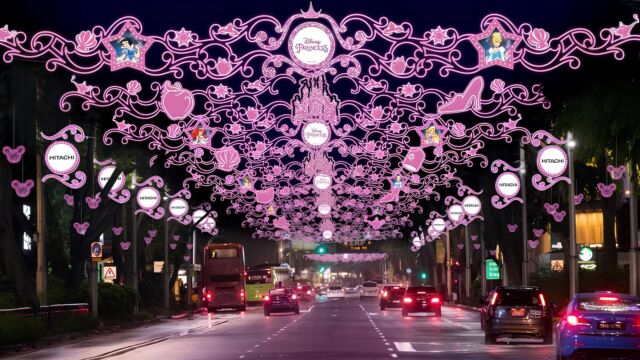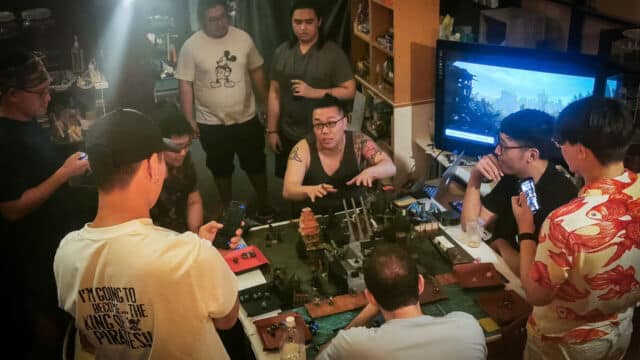I Bought a Condo, and Feel Like a Stranger
Photo: Josephine Phay
A condominium | 2,933 words
I am an unfilial daughter. I know this. I know it like I know the stories of how my parents gave me my name, my childhood, my shot at life. Am I over-generalizing if I say this is one of the marks of an Asian parent? I mean, this vehement insistence that the relationship between parent and child is an eternal debt, a cosmic transaction? A Gordian knot of DNA and memories so intricately scrambled together that there is no way to establish good, clear boundaries between them—and me?
I did try. That is how I know I am unfilial. I am a bad daughter because I bought my own place, and moved out of my parents’ home.
*
Singapore is a nation of home owners. In this petri dish of an island nation, home ownership rates have held steady at close to 90% for decades. Growing up, I always detected, whenever the adults spoke of people who rented their homes, some faint, acrid whiff of disapproval or, worse yet, pity. One works hard to buy their own shelter, in Singapore. Owning, as opposed to renting, your home is a mark of growing up, of stability, of belonging.
Singapore has also, famously, been called “a nanny state,” because the government, like the stereotypical ever-hovering Asian parent, seems to oversee so many aspects of what other cultures would consider the business of the individual, not the state. Then again, home ownership rates on this carefully-designed island are so high because the government made it their business, early on, to provide public housing at affordable prices. This public housing takes the form of apartments, called Housing Development Board (HDB) flats, after the statutory board which oversees everything to do with these units. Banish the thought of rundown inner city public housing projects. Not in Singapore. HDB developments are well-designed, run the gamut from studio apartments to massive, four-bedroom units oriented to large families, and most importantly, are generally priced within reach of the “average working Singaporean.”
But sometimes, the heart—or is it the ego—wants more than the “average.”
Growing up, I’d been told, over and over, that it took my parents fourteen years, on their combined income, to pay off the two-story semi-detached I grew up in. I know the stories of the sheer will, the hard decisions, the deprivations suffered, in order to achieve this stunning thing in land-scarce Singapore: to actually own landed property. My parents sound so proud, still, whenever they (re)tell these stories. With the vast majority of Singaporeans living in HDB flats, they managed to purchase not just private property, but a house—which is not an HDB apartment, which is surrounded by an actual garden. They achieved one version of the Singaporean Dream.
So why were my parents so unhappy when I found this place? My place?
My mother was silent. My father was vocal. He kept pointing out the terrors of home ownership, the drudgery of home upkeep, the sheer grinding pressure of keeping up with a mortgage.
Alone.
Truth be told, my father hadn’t needed to scare me. I was already scared. I was/am well aware of what “owning”—beautiful lie—a condo means. I already knew: signing that contract meant a Faustian bargain, a lifetime commitment to repaying that mortgage.
I know I don’t “own” this place. Not really. Not until I exchange enough hours of my life to erase the zeroes the bank has written against my name. What’s that cliché? Beware, child of modern consumption, lest your material belongings own you? What’s the thing people would tell me if I dare speak these thoughts? Oh, but you chose to buy the condo, instead of an HDB unit.
I already saw—or thought I saw—what it would mean, to try and do all this alone.
But I needed to do this. I needed a place where I could be myself—where I could learn to bemyself. I wanted to be away from my parents, and the way they were holding me to my childhood in ways which were becoming painful.
And I was running out of time. Because in another way, I wasn’t alone.
*
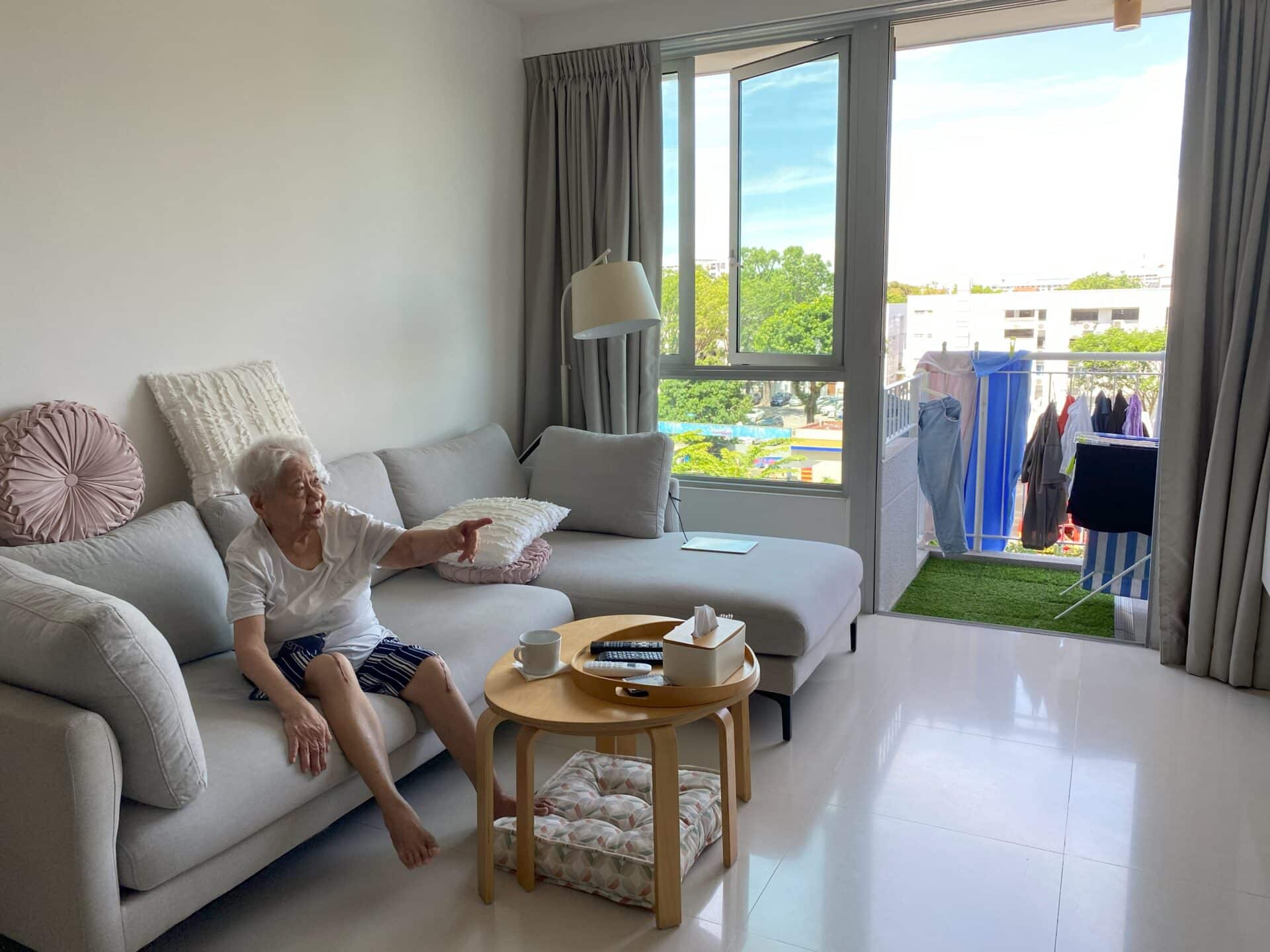
It was something like dating, this process of seeking out my maybe-could-it-be-possibly-forever-home. The home is such a central yet protean icon in the Singaporean psyche. Laughable, perhaps, but in this weird little nation state, “Shall we apply for an HDB flat together?” is bashful-pragmatic-Singaporean speak for “Would you marry me?” And just like in dating, one must tangle with so many prospectives, an endless parade of well-maybe-but-alas-the-price-is-wrongs, an apparently impenetrable wall of rejections, before stumbling into/onto The One.
And yes, you can be rejected in the process of shopping for property. In Singapore, you must be married, or thirty-five and older, in order to buy an HDB flat, even on the resale market. Either that, or you must purchase the flat with your parents.
Therein lay the catch. I wasn’t thirty-five then. And I would not be living with my parents. I would be living with my grandmother.
It’s a familiar story, one played out in melodramas from Taiwan to Thailand: the multi-generational Asian family crammed together in the family home, simmering with discontent and constant, low-key, grinding conflict.
Did Grandma put the idea of (unfilial) escape in my head, when she sighed, wouldn’t it be lovely to live in a small condo of our own?
Condo, she said, because for her generation, too, that is The Dream.
Every petty wrangle, every domestic eruption, only served to fill the hourglass in my head, rapidly spilling the hours of a life I slowly realized we could be living instead of all the endless close-quarters skirmishing in my parents’ house. We—Grandma and I.
Grandma was eighty-two the year I signed the contract.
And so you see—my lack of filial piety knows no bounds. I not only left my parents’ house—I took my father’s mother with me.
*

I searched long and hard for this place. A two-bedroom condominium, located right above Kovan MRT station. You leave the salmon-pink embrace of the train station via a long escalator which, on certain days, at certain times, feels like a leisurely stairway to heaven, because all you see from the bottom is bright sky. Then, as you ascend–not entirely smoothly, because the escalator judders slightly–cream walls slide into view.
Step off the escalator. Try not to stare at the ladies filming a TikTok dance video in the narrow corridor formed between the edge of the condo and the outer limits of the station. Go down three steps, dodging the toddler in the orange booties and the elderly man tap-tap-tapping his cane. Hold your keycard against the cantankerous reader, push through the turnstile, and you’re in.
The condo is—as things go in this odd little city-state, where buildings are as evanescent as bubbles due to a constant compulsion to maximize profit and land use—a relatively elderly development, having finished construction in 2006. That seems fitting too.
Because I am not actually alone. Some days I feel like what I’ve done is purchase a luxury box in which to get better acquainted with death and dying.
In Singapore one searches, preferably, for a place of their own within a certain radius of one’s parents. The government encourages this, through—what else?—the lure of lucre. Baby birds must leave the nest—but not go too far. Because the other thing which we are constantly reminded of—and which I can feel in a knock-at-my-heart sort of way, every time I look around me—is that Singapore faces an aging population problem.
Imagine that. That people living too long is now a problem. Imagine the sheer audacity, the sheer rude-finger-in-the-face-of-the-gods brazenness of this concept.
I sit at my white IKEA dining table, on my black IKEA chair. I look at my grandmother. We are eating out of IKEA bowls, using cutlery I bought from—yes—IKEA. The very elderly Chihuahua we live with (I can hardly say “my” Chihuahua, when it’s clear who wields ultimate power in this household) totters out of my bedroom and weaves rather drunkenly between my feet. I bend over and pick her up very, very carefully. She’s unwell—has been for a while. As I set Tish down, my grandmother starts coughing.
It’s a constant terror—the idea that one day, Tish might bumble into my grandmother, or that my grandmother might not look very carefully at where she’s putting her feet. One old lady walking into another. Tragicomedy. Disaster.
I bring Grandma water. I wait for the coughing fit to pass.
I sit at the table, and realize anew: in many ways, I am not alone in this place. Not yet.
*
Then again, there are days and nights when I love living here.
From where I stand on the edge of the balcony, the night sky is not quite black. Grey smudges of cloud form a sort of trompe l’oeil crown behind the uneven mountain range of the HDB blocks beyond. The petrol station across the street glows with neon force. Cars pull silently up to the petrol pumps, then just as silently disappear. They are never the same ones.
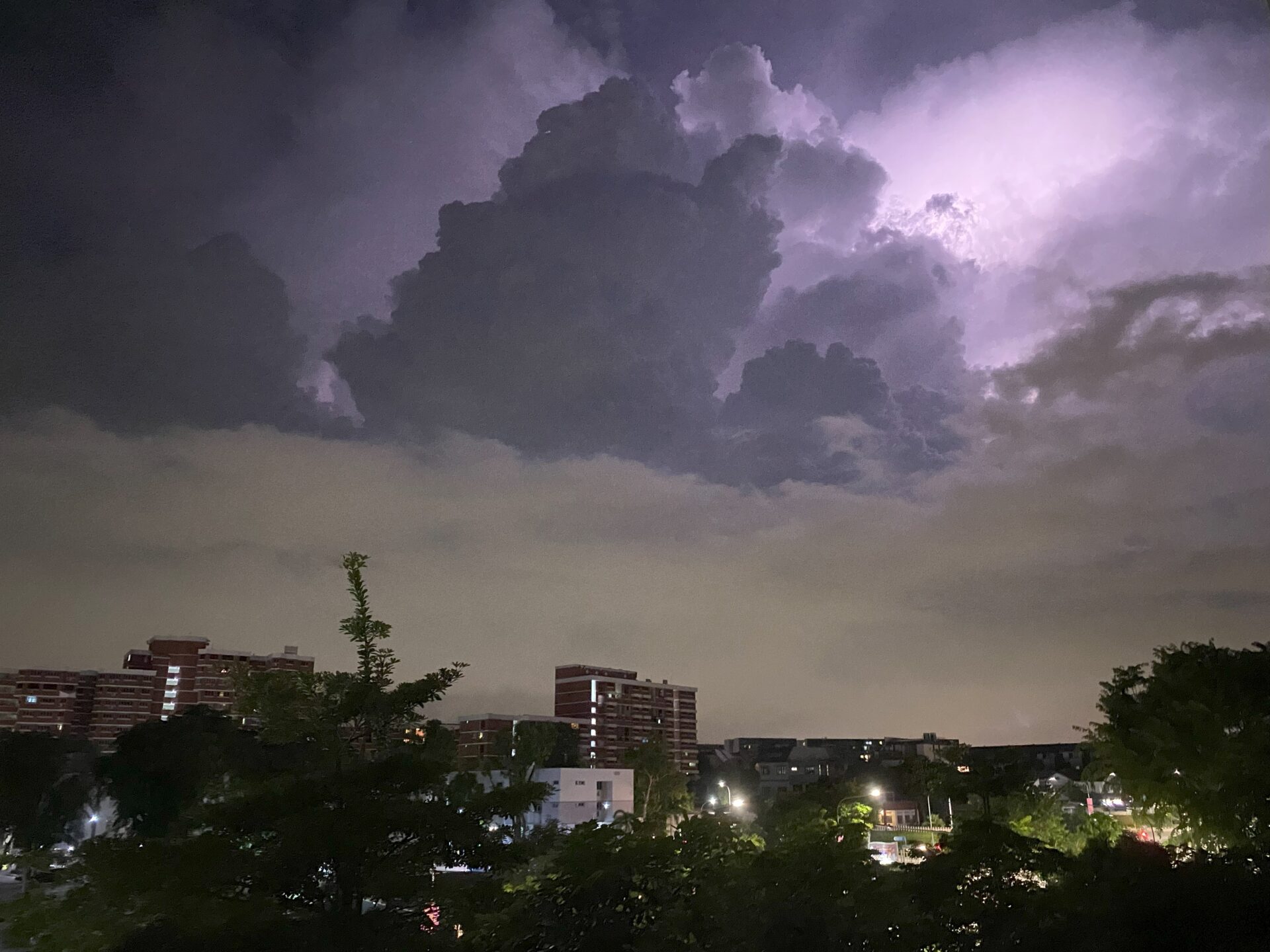
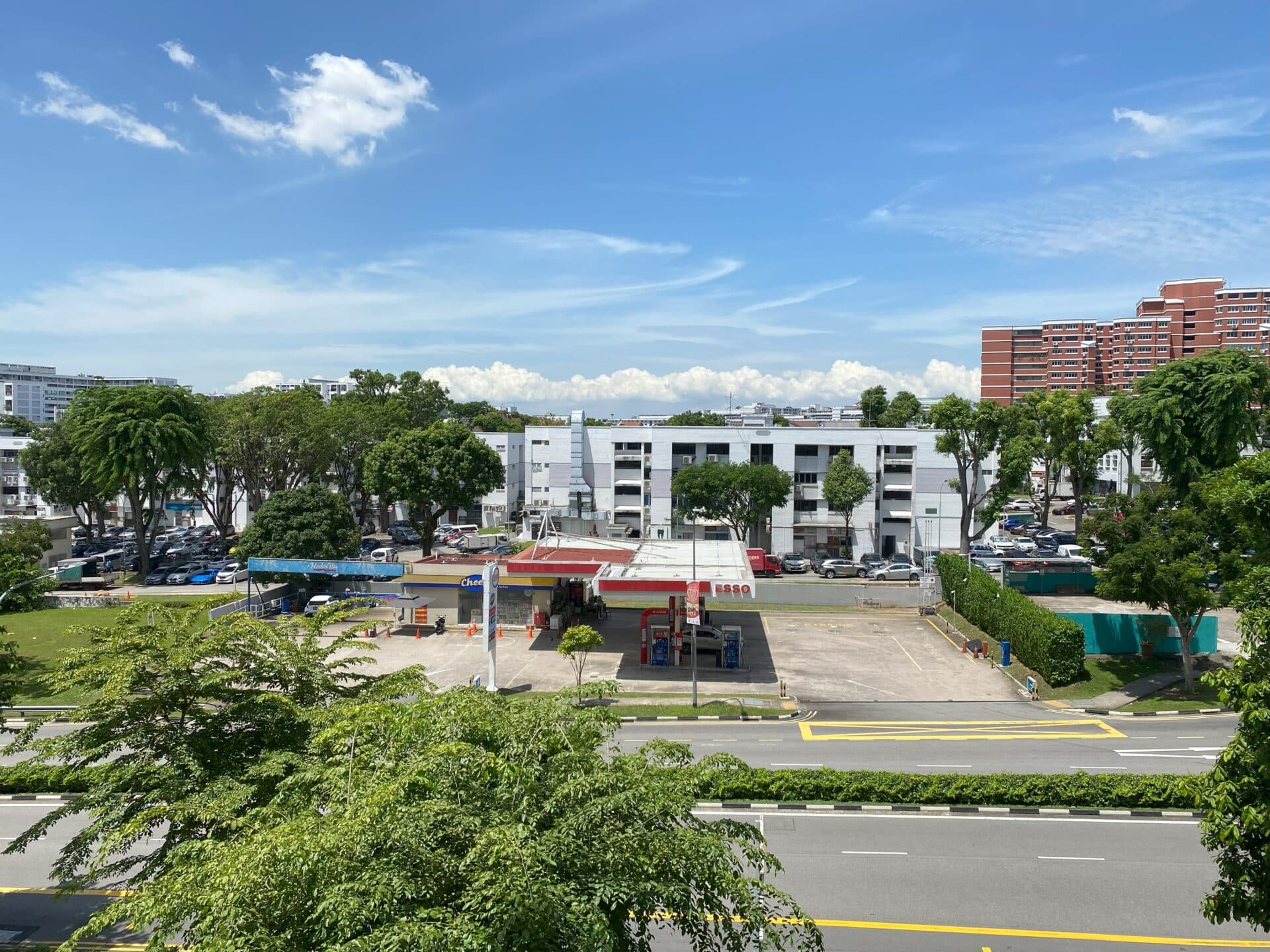
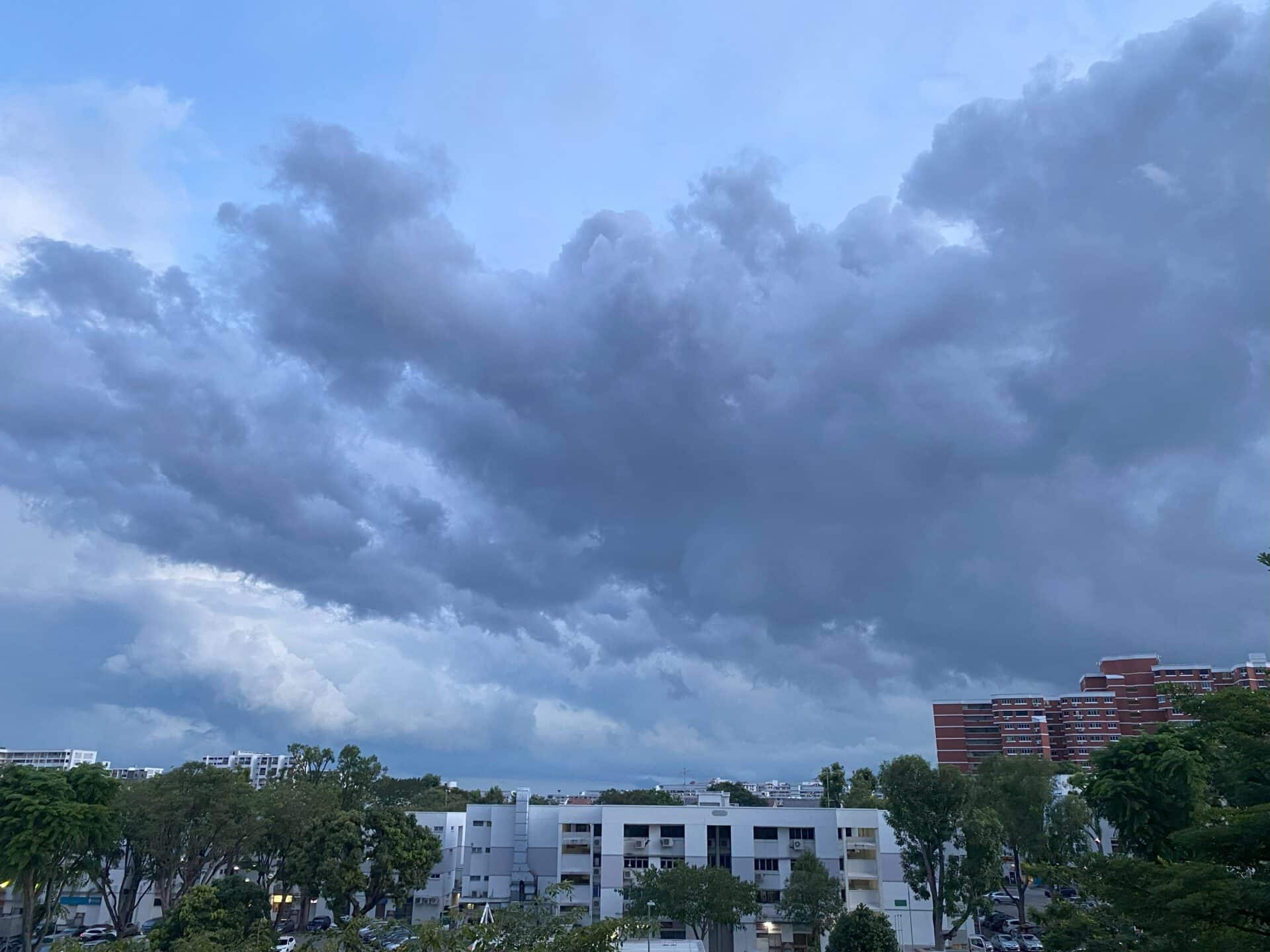
Framed in the doorway, I dream. I make up stories about the strangers before me. That woman who bursts out of her SUV with such vim and gusto, even though it’s three in the morning—what must she be like? Those two taxis parked side by side in companionable silence in the far corner—are their drivers friends too?
Very, very slowly, more and more vehicles start to appear on the road, a tide of commuters ebbing in the direction of town. Then more and more. Lights switch off in the rectangles-within-rectangles of the windows that march up and down the sides of the tall buildings which I see in a wide arc all around me. Homes, hundreds of homes.
Dawn comes upon all of us.
I really love how light floods the condo.
I loved the space the moment I walked in.
The real estate agent—odd term, for someone who sells dreams and mirages—swings the door wide and bustles in. I stand still, caught in the doorway, because I am so obscurely moved, so strangely excited. Through the windows across the light-bright room, I can see the tops of trees. The wind turns the rustling leaves into a hypnotic undulation of greens and yellows and browns. The blocks of flats beyond the window form Mondrian shapes against the baby blue of the sky. But above all, I am excited by how bright, how warm, the living room feels.
The agent is talking about how this unit is south-facing, how the unit above has no balcony, so there is no shelter over my balcony (yes, my; I fall in love quickly)…
I get the impression that the agent considers this never-ending supply of light and warmth something of a disadvantage. Little does she know I’m already choosing furniture in my head. Bright white, of course, to reflect all this lovely, delicious light.
I know many people enjoy going to open houses not because they’re looking to buy, but for the sheer pleasure, I suppose, of wandering through a beautifully done up show flat. For the indulgence of dreaming.
I look at the vast windows in the second, smaller bedroom, stretching from bay window to ceiling, and already I am imagining myself curled up in the corner, shoulder pressed against the sky and light and warmth. Reading, perhaps, or typing on my laptop.
Did I fall in love with the apartment itself, or with what I imagined it could become? Did I fall in love with the material fabric, or with the realization that here, at last, was a chance for me to choose?
I look at the blank white walls, and think to myself, I can finally put up pictures. On the walls. With nails. I can swap out pictures when I get tired of them. I can leave nail holes in the walls if I so choose.
In my parents’ house, I was never allowed to put up pictures, not even in “my” bedroom. My sister did, but then my sister never followed rules. I didn’t realize, until that exciting image of putting up wall decorations popped into my brain with such ferocity, how much I’d envied her.
But then later, when the time comes to put up that first picture, in its carefully chosen frame—I find I can’t.
It’s absurd. I stand there, the wooden frame (IKEA too) waiting. I simply cannot bring myself to hammer the nail into the wall. The wall does not leer at me, or do anything cliched like that. It’s simply a wall. Blank, serene. An empty space of infinite possibility.
Wasn’t it Isak Dinesen who wrote that weird, evocative story, “The Blank Page?” In this story about a kingdom where the blood of defloration is proudly exhibited, the blank page becomes an act of (gendered) resistance.
Blank sheets. Blank pages. Blank walls.
I bought this place. In a country where singles can only purchase public housing after the ripe old age of thirty-five, I chose, instead, in my impatience, in my arrogance, to buy this condo.
Alone.
Pristine walls. Dazzling white, reflecting light. The light is almost overwhelming.
I stand in my (sort of) own room in my (by contract) own house, and stare at the emptiness of the structure before me, and feel myself becoming more and more dismayed.
*
“So how are you enjoying your new place?” My colleague sounds so happy for me.
In my head I’m rewriting a six-figure number, one with entirely too many zeroes. I know exactly how many years it will take me to whittle that fearsome number down.
Honeymoon periods don’t last.
I smile. I say, “I love that I get to decorate the place exactly as I want.”
Well, that’s not entirely untrue.
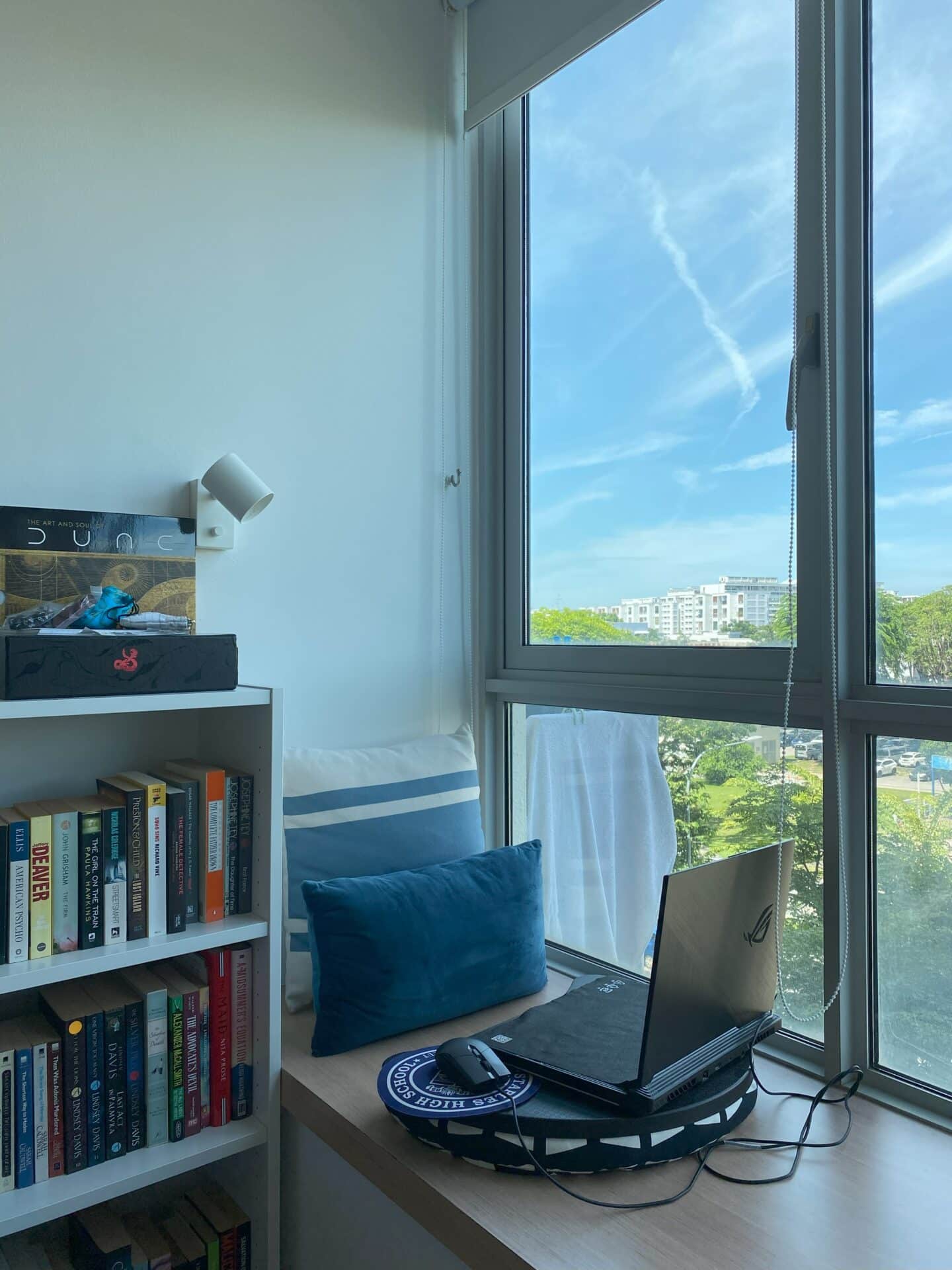
Colors. Shapes. Textures. The gently mellowing browns and brights of my books. The elegant black-and-white, Peranakan-ish tiles of the shower backsplash, so delightfully bumpy to the touch. The coolness of the living room tiles. The warm grip of the kitchen tiles. The pregnant roundness of the moon-shaped mirror just beyond the front door. The cheerful cartoon presence of the dog-shaped doorstopper (his name is Teddy.)
I chose these things. I think.
*
I lie on the L-shaped bit of the sofa, staring at the flickering LED light in the false ceiling. For whatever reason, all the lights were installed at the same time, yet only this bulb in this one corner is going, going… White light jitters and strobes and my grandmother complains that she’s getting a headache. She asks what I intend to do about the dying bulb.
I make a noncommittal answer, loosely but reassuringly indicative of decisive action to be taken in the near future. I know I’m lying. I know that I will take no action whatsoever.
Does that lie make me an unfilial granddaughter, too?
I gaze up at the light, which is sparking with what feels like increasing fury. This is a desperation which will go unanswered.
I’d chosen that sofa. I’d chosen the color of the light—cool white. The false ceiling is a holdover from the previous owner—but then I’d chosen to retain it.
I’d chosen to move out of my parents’ home. I know now why I’d forged on despite my fear of this dreadful financial commitment: because it meant that I can choose how I live, how I move through time and space. Because it meant that, as I’d said to my colleague, I could choose the shapes and colors my eye would light upon, the textures my skin would brush, the paths my feet could take. I’d chosen all this. I’d chosen to choose.
So why these moments, still, out of the blue, when I am standing on the balcony, or sitting in my bed, and suddenly it hits me—that I am a stranger?
I am a stranger, here, in this place, despite Grandma, despite Tish, despite the way I’ve cocooned myself in things I’ve said “yes” to, to all these decisions I’ve made.
It has been years since I moved in. What’s going on?
The walls are still untouched by nail marks. The pictures I love sit in their frames on shelves, on surfaces. At least this way, I can move them around freely. Impermanence has its perks.
Blank walls. Blank pages. No answers.
I sit with these odd, entangling emotions. I sit with these doubts. I pay my mortgage at the start of each month. I carry on moving through this space, in ways I think—I hope—I’ve chosen.
The ghost of the semi-detached house I grew up in still lingers in my movements, in my assumptions, in the things I do and do not do.
I look at my grandmother. I try to tell myself that this isn’t a room of my own. But these attempts to reassure myself ring false, even in the privacy of my own head. I know that one day, I will move like a ghost, truly alone, through these rooms, or through other rooms—because nothing is permanent in this odd, mirage-filled island nation, not family, not people, not even forever homes.
© Josephine Phay
Commissioning editor: Verena Tay




